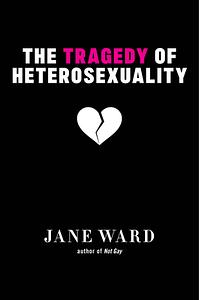Take a photo of a barcode or cover
informative
fast-paced
One of the first books about relationships that I’ve read that acknowledges that straight men don’t genuinely like women and that our culture perpetuates this.
informative
inspiring
It just didn’t interest me much, plus it had a very allo prospective and I have a bunch of books that are more my speed to read
challenging
informative
reflective
slow-paced
informative
reflective
slow-paced
DNF 14% (30pages)
honestly it got repetitive and boring to read, it didnt teach me anything about gender that i didnt already know
honestly it got repetitive and boring to read, it didnt teach me anything about gender that i didnt already know
Read for class.
I think this book is certainly meaningful, even if it felt a little scant at times (and trust me, I rarely want academic books to be *longer*). I feel that Ward could’ve dived further into analysis of heterosexuality— perhaps including ethnographic research beyond the exploration of pick-up artists or delving into more media analysis. I also think Wade almost entirely ignores the ways queer people neglect each other, painting the queer world as a Utopia—respectful and innovative.
Still, I do agree that heterosexuality is often tragic. I am constantly watching the women I know settle for men who do little to meet their emotional, physical or intellectual needs. I am also constantly watching men struggle with their need to express their emotions and their inability to do so outside of romantic relationships. So, I do think people (especially straight men) should pick this book up, if only to get the wheels turning. I think heterosexuality can be made enjoyable and equitable. and that the world would almost certainly be better if it was.
I think this book is certainly meaningful, even if it felt a little scant at times (and trust me, I rarely want academic books to be *longer*). I feel that Ward could’ve dived further into analysis of heterosexuality— perhaps including ethnographic research beyond the exploration of pick-up artists or delving into more media analysis. I also think Wade almost entirely ignores the ways queer people neglect each other, painting the queer world as a Utopia—respectful and innovative.
Still, I do agree that heterosexuality is often tragic. I am constantly watching the women I know settle for men who do little to meet their emotional, physical or intellectual needs. I am also constantly watching men struggle with their need to express their emotions and their inability to do so outside of romantic relationships. So, I do think people (especially straight men) should pick this book up, if only to get the wheels turning. I think heterosexuality can be made enjoyable and equitable. and that the world would almost certainly be better if it was.
reflective
medium-paced
So much about this book is exhausting. While it makes great points, it's very divisive and therefore, in my opinion, unsuccessful in its mission.
The straights are not OK.
This book felt to me like a single investigative/academic piece broken into three parts. In part one Ward unpacks what she calls the “Heterosexual Repair Industry”. She points out the oddity of heterosexuality being the “default setting of society” and yet there are countless books, articles, and products that seemingly try to repair a divide between men and women as if they must be convinced to actually like one another. She asks multiple straight women what they like most about men and the lack of enthusiastic answers is as awkward as it is predictable.
In part two Ward describes her experience of attending two Pickup Artist Workshops. She investigated how the industry which expended in popularity in the early 2000s thanks to Neil Strauss’s The Game has evolved into something similar but weirder in the 2010s and 20s. She finds herself empathizing with the men at this $2,000+ 2-day seminar who discuss their relationship anxieties in something akin to a group therapy session. Ward compares this to a women’s infertility support group: these men felt like they could expect something that was their right but it’s just not happening for them. Understandably, her sympathy for them diminishes when these men share their vulnerability and then immediately state that their goal for the seminar is to learn how to hook up with a lot of young, large-breasted women who are deferential to them.
Part three features a collection of interview answers from a diverse range of anonymous queer associates of Ward describing their assessments of straight culture. They catalog how it is sometimes problematic, dangerous, though above all else inexplicably weird.
Ward wraps up the book with a brief but clear invitation: not for straight people to attempt queerness but to try an approach of “Deep Heterosexuality” where men and women genuinely appreciate their differences from one another and desire the best aspects of each. The book is thoughtful and insightful and I highly recommend it.
This book felt to me like a single investigative/academic piece broken into three parts. In part one Ward unpacks what she calls the “Heterosexual Repair Industry”. She points out the oddity of heterosexuality being the “default setting of society” and yet there are countless books, articles, and products that seemingly try to repair a divide between men and women as if they must be convinced to actually like one another. She asks multiple straight women what they like most about men and the lack of enthusiastic answers is as awkward as it is predictable.
In part two Ward describes her experience of attending two Pickup Artist Workshops. She investigated how the industry which expended in popularity in the early 2000s thanks to Neil Strauss’s The Game has evolved into something similar but weirder in the 2010s and 20s. She finds herself empathizing with the men at this $2,000+ 2-day seminar who discuss their relationship anxieties in something akin to a group therapy session. Ward compares this to a women’s infertility support group: these men felt like they could expect something that was their right but it’s just not happening for them. Understandably, her sympathy for them diminishes when these men share their vulnerability and then immediately state that their goal for the seminar is to learn how to hook up with a lot of young, large-breasted women who are deferential to them.
Part three features a collection of interview answers from a diverse range of anonymous queer associates of Ward describing their assessments of straight culture. They catalog how it is sometimes problematic, dangerous, though above all else inexplicably weird.
Ward wraps up the book with a brief but clear invitation: not for straight people to attempt queerness but to try an approach of “Deep Heterosexuality” where men and women genuinely appreciate their differences from one another and desire the best aspects of each. The book is thoughtful and insightful and I highly recommend it.
This book is amazing, informative, and really easy to read. It discusses important topics, such as women and heterosexuality, for instance, and how LGBT people aren’t filled with hate towards straight people, theyre actually concerned about their wellbeing. The opening line was amazing, eye catching, and immediately piqued my interest.






